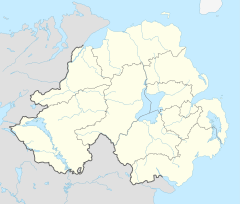Bellaghy
This article includes a list of references, related reading, or external links, but its sources remain unclear because it lacks inline citations. (September 2013) |
Bellaghy
| |
|---|---|
 Road into Bellaghy in 2007 | |
Location within Northern Ireland | |
| Population | 1,063 (2001 Census) |
| District | |
| County | |
| Country | Northern Ireland |
| Sovereign state | United Kingdom |
| Post town | MAGHERAFELT |
| Postcode district | BT45 |
| Dialling code | 028 |
| Police | Northern Ireland |
| Fire | Northern Ireland |
| Ambulance | Northern Ireland |
| UK Parliament | |
| NI Assembly | |
Bellaghy (from Irish Baile Eachaidh, meaning 'Eachaidh's Town')[1] is a village in County Londonderry, Northern Ireland. It lies north west of Lough Neagh and about 5 miles north east of Magherafelt. In the middle of the village lies the junction of three main roads leading to Magherafelt, Portglenone and Toome. It had a population of 1,063 people in the 2001 Census. It is situated within Mid-Ulster District.
It is known as the birthplace and childhood home of poet Seamus Heaney (1939-2013), who won the Nobel Prize for Literature. In October 2016 a new arts center, dedicated to him and known as the Seamus Heaney HomePlace, opened here. The $5.2 million building was constructed on the site of a former headquarters of the Royal Ulster Constabulary.[2]
History
There had long been Gaelic settlements in this area. Archaeological evidence has been found in the village of a Gaelic ringfort.
In the early 17th century, Bellaghy became one of many towns planned, built and settled under the authority of the Vintners Company of London, as part of the English Plantation of Ulster. In 1622, according to a manuscript of a Captain Thomas Ash, Bellaghy consisted of a church, a castle, a Corn Mill and twelve houses.

During the Plantation, English colonials built a fortified house in the village. It had surrounding walls and two circular towers at opposite corners. This is the best-restored example of a fortified house to be found anywhere in Northern Ireland.[citation needed] Recent excavations have revealed that the fortified house was built on the site of a former Gaelic ringfort.
During the 1641 rebellion the house was attacked by Local United Irishmen, but it remained intact. Many other houses in the village were burnt to the ground. Locally it was always referred to as "The Castle;" it is located on what became known as Castle Street. The refurbished house was opened to the public in 1996 as "Bellaghy Bawn" (although that name was not used in the locality previously). It is operated as a museum featuring exhibitions on local natural history, the history of the Ulster Plantation, and the poetry of Nobel Laureate Seamus Heaney. Heaney was born in Bellaghy on his family's farm and lived here for most of his childhood. He later lived in Dublin but is buried in the graveyard of St Mary's Catholic Church.
The village has been the centre of a rural community dominated by farming. Seamus Heaney, who became a Nobel Prize-winning poet, was born as the eldest of nine children at Mossbawn, his family's farm. A new arts centre, dedicated to him and known as the Seamus Heaney HomePlace, opened here. The $5.2 million building was financed by the Mid-Ulster District Council. It was constructed on the site of a former headquarters of the Royal Ulster Constabulary, which had a contentious role during the Troubles. The centre will feature talks, poetry readings, and performances. It has exhibits of photographs, texts, and poems to show the influence of place on his language.[2]
Two Bellaghy natives, Francis Hughes and his cousin Thomas McElwee, died participating in the 1981 Irish hunger strike during the Troubles. They were protesting at the treatment by the British and supporting political change in Northern Ireland. Other Republicans include Dominic McGlinchey Senior, his wife Mary and his son Declan who died of a heart attack.
2001 Census
Bellaghy is classified as a Village by the NI Statistics and Research Agency (NISRA), i.e. with population between 1,000 and 2,250 people. On Census day (29 April 2001), there were 1,063 people living in Bellaghy. Of these:
- 31.4% were aged under 16 years and 12.7% were aged 60 and over
- 49.9% of the population were male and 50.1% were female
- 99.0% were from a Catholic background and 1.0% were from a Protestant background
- 4.6% of people aged 16–74 were unemployed
See also
References
- ^ Bellaghy Placenames Database of Ireland. Retrieved: 2013-09-01.
- ^ a b Roslyn Sulcas, "Ireland Celebrates the Life and Legacy of Nobel Prize-Winning Poet", New York Times, 17 October 2016


